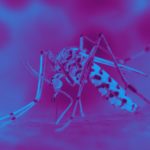Lien vers Pubmed [PMID] – 25058400
PLoS Negl Trop Dis 2014 Jul;8(7):e2978
INTRODUCTION: Plasmodium knowlesi is now recognised as a leading cause of malaria in Malaysia. As humans come into increasing contact with the reservoir host (long-tailed macaques) as a consequence of deforestation, assessing the potential for a shift from zoonotic to sustained P. knowlesi transmission between humans is critical.
METHODS: A multi-host, multi-site transmission model was developed, taking into account the three areas (forest, farm, and village) where transmission is thought to occur. Latin hypercube sampling of model parameters was used to identify parameter sets consistent with possible prevalence in macaques and humans inferred from observed data. We then explore the consequences of increasing human-macaque contact in the farm, the likely impact of rapid treatment, and the use of long-lasting insecticide-treated nets (LLINs) in preventing wider spread of this emerging infection.
RESULTS: Identified model parameters were consistent with transmission being sustained by the macaques with spill over infections into the human population and with high overall basic reproduction numbers (up to 2267). The extent to which macaques forage in the farms had a non-linear relationship with human infection prevalence, the highest prevalence occurring when macaques forage in the farms but return frequently to the forest where they experience higher contact with vectors and hence sustain transmission. Only one of 1,046 parameter sets was consistent with sustained human-to-human transmission in the absence of macaques, although with a low human reproduction number (R(0H) = 1.04). Simulations showed LLINs and rapid treatment provide personal protection to humans with maximal estimated reductions in human prevalence of 42% and 95%, respectively.
CONCLUSION: This model simulates conditions where P. knowlesi transmission may occur and the potential impact of control measures. Predictions suggest that conventional control measures are sufficient at reducing the risk of infection in humans, but they must be actively implemented if P. knowlesi is to be controlled.

